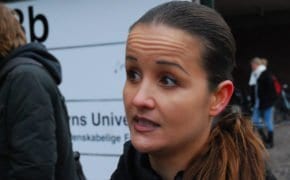Universitetsavisen
Nørregade 10
1165 København K
Tlf: 35 32 28 98 (mon-thurs)
E-mail: uni-avis@adm.ku.dk
Section
Embattled brain scientist threatens University of Copenhagen with court if it cancels her PhD and doctorate

Fundamental building blocks of plant life exposed at new centre, DynaMo. Follow their daily work in our gallery

The Danish Committees on Scientific Misconduct have put forth their assessment of the first two Milena Penkowa cases. Their judgement is clear - Penkowa is found guilty of using false and misleading data, reports Weekendsavisen today

During the recent Rio+20 conference climate change was hotly debated but the people gathering the data remained behind the curtains. The University Post talks to one of Copenhagen's very own researchers about life in the field, the dangers, the politics and the boredom of living in the Arctic circle

Research team believes a handful of ancient bones buried beneath an old church in Bulgaria may be actual remains of John the Baptist, the biblical figure said to have baptised Jesus

The University of Copenhagen's communication department clashed with the Society of Danish Science Editors this week in debate over who gets to read research and the cost of access to science

Copenhagen's 49-year old Finnish scientist Timo Kivimäki will not appeal his five month prison sentence for giving information to the Russians

Pro’s and con’s of increased public surveillance the focus of network and upcoming conference

Fuzzy regulations over diplomatic contacts irritates the head of the political science department. No decision yet on Finnish professor's status at University

Greenland’s glaciers can recuperate within a short time frame if temperatures drop, shows research from the University of Copenhagen. 80-year-old photographs, discovered in a basement archive, prove that the ice was actually melting faster then, than it is now. See some of the old photos right here
